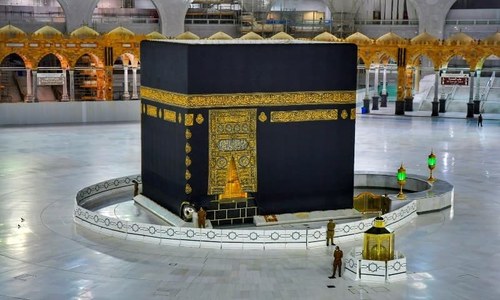MINA: Pilgrims cast sanitised pebbles on Friday as they symbolically “stoned the devil” in one of the last major rites of Haj, which the Saudi king acknowledged had been tough to organise amid the coronavirus pandemic.
Massive crowds in previous years at times triggered deadly stampedes during the ritual, but this year only up to 10,000 Muslims are taking part after millions of international pilgrims were barred due to the health crisis.
In the scorching heat, worshippers made their way across Mina Valley near Makkah under the watchful eyes of security forces, to “humiliate” the devil.
Masked pilgrims, clad in white and spaced apart on marked spots to observe social distancing, threw seven stones each at a wall symbolising the Satan.
Instead of gathering the pebbles themselves as in past years, they were handed them bagged and sterilised by the Haj authorities, to protect against the novel coronavirus.
Holding the ritual in the shadow of the pandemic required “double efforts” by Saudi authorities, King Salman said, a day after being discharged from hospital following surgery to remove his gall bladder.
“The Haj this year was restricted to a very limited number of people from multiple nationalities, ensuring the ritual was completed despite the difficult circumstances,” said the kingdom’s 84-year-old ruler.
His speech was read out on state television by the acting media minister. Last year, King Salman made the trip to Mina and was seen on state-run television observing worshippers from the window of a high-rise.
Haj typically costs thousands of dollars for pilgrims, who often save for years as well as endure long waiting lists for a chance to attend. But this year, the Saudi government is covering the expenses of all pilgrims, providing them with meals, hotel accommodation and health care, worshippers said.
Haj is usually one of the world’s largest religious gatherings. But local media said up to 10,000 people already residing in the kingdom are participating this year, compared to 2019’s gathering of some 2.5 million from around the world.
“I am so happy to be chosen among millions for Haj this year,” Saudi pilgrim Wedyan Alwah said. “My lifetime dream has come true.”
After the stoning ritual, pilgrims returned to the Grand Mosque in Makkah to perform a final tawaf, or circling of the Kaaba.
The pilgrims, who have all been tested for the virus and are subject to regular temperature checks, are also required to be quarantined after Haj, authorities said.
Six hospitals, 51 field clinics and 200 ambulances catered to the faithful, health ministry spokesman Mohammad al Abd Al Aly said. Some 8,000 health care professionals were also deployed, he added.
Published in Dawn, August 1st, 2020















































Dear visitor, the comments section is undergoing an overhaul and will return soon.